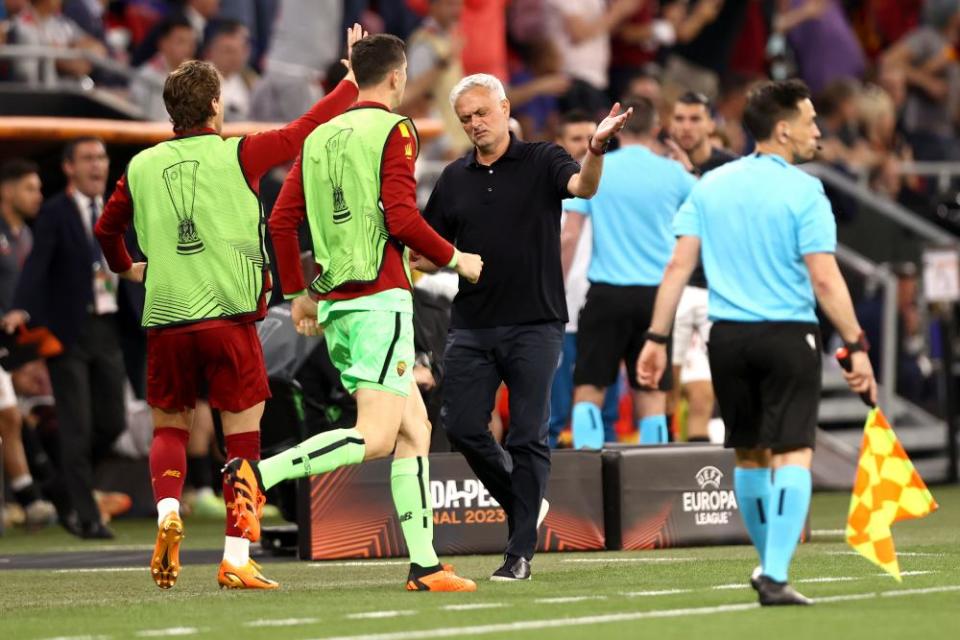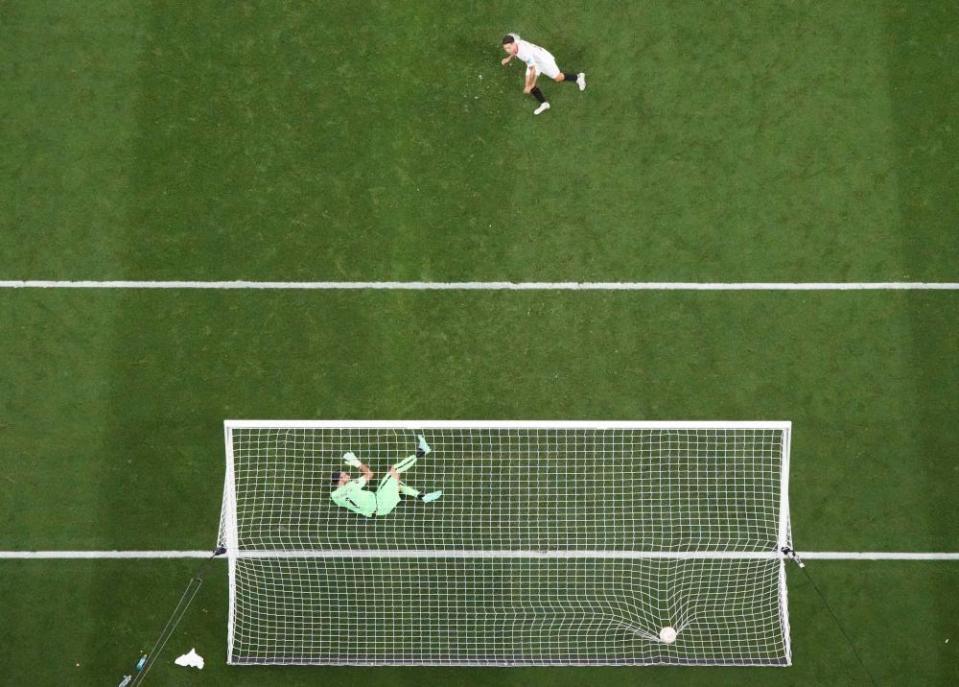Montiel edges Sevilla to seventh Europa League triumph with win over Roma
Sevilla’s empire just will not fall, not even to the Romans. After three long, exhausting hours, the match that, like their extraordinary dominance of this competition, seemed like it would never end, came down to a single kick. Or so it seemed: instead, past midnight in Budapest, the Europa League final that began in May and didn’t conclude until June came down to two of them. Which somewhere in the noise and the nerves and the tension of the penalty shootout, of this whole wild night and Sevilla’s entire miraculous story, felt fitting. Just as it did when Jesús Navas, the kid who grew up at the club and the captain who is 37 now, lifted those fifteen kilos of silver to the sky, 17 years after he first did so.
Two superb saves in the shoot out from Yassine Bono, from Roger Ibañez and Gianluca Mancini meant that Gonzalo Montiel, the Argentinian who scored the penalty that won his country the World Cup was entrusted with taking the penalty that would win his club their seventh – yes, seventh – Europa League. This time he did not score, his shot saved by Roma’s Rui Patrício, but Anthony Taylor – who had given and taken away a penalty for Sevilla during the actual game - was advised by the VAR of an encroachment. And so he gave Montiel another chance, and this time he found the net, Sevilla supporters streaming down the stands and onto the pitch in celebration.
Related: José Mourinho fights the bad fight, but ends up on the losing side | Jonathan Wilson
It had been tough, tense, sometimes attritional and it lasted 147 minutes before the shoot out, more than three hours in all, but here was liberation. The longest match in this competition’s history was also the game with more cards than any other – thirteen just for the players, not counting the many waved at the men on the benches. There had also been two big penalty shouts: one not given to Roma and the one given and taken away for Sevilla. Then there were eight more in the shoot out, Montiel made to take his decisive kick twice. Eventually, history was made.
Maybe It was always going to go this way when the invincible meet. If this competition is Sevilla’s, they had not yet come up against José Mourinho. Here, they did, and it was a hell of a fight. Sometimes, almost literally. Sevilla had played six Europa League finals and won them all; Mourinho had been in five European finals and done the same. Eleven occasions like this, without falling and by the end of this somehow they were still standing. Until that one, last astonishing roar, the final breath.
At 62, José Luis Mendilibar, only in the job three months, on a mission to rescue a team threatened by relegation, was coaching his 965th game but only his fifth in Europe. By the end of it he was a champion, the fourth manager to win this trophy with Sevilla, the club that loves it like no other. Mourinho was defeated for the first time and finding it hard to take, his runner’s up medal given to a fan.
Once into extra time, Paulo Dybala’s opener levelled by a Gianluca Mancini own goal, it felt like there was no way penalties could be avoided – even if Sevilla looked for a winner and although Chris Smalling so very nearly won it for Roma in the very last minute when his header came back off the bar. They would have to wait a little longer, beyond midnight, by which time it was hard to recall everything that had gone before, reduced to a single decisive moment. In truth, that was partly because it hadn’t always been memorable. But it was heart-stopping, alright.

There had been moments too, beginning with the goal that opened the scoring after 34 minutes, a second’s hesitation enough for the knife to be slipped in. Ivan Rakitic was nudged off the ball by Bryan Cristante, leaning head down into him, and as Sevilla paused, the Croatian waiting for the foul, Gianluca Mancini stepped forward and played the pass first time towards Dybala. Suddenly in space to the left of the Sevilla centre backs, he took one touch to control and then steered the shot past Bono and into the net, then headed to the corner, throwing himself to the turf.
From the touchline they came, a stampede of subs and staff heading past Mourinho and onto the pitch. He turned the other way, through the crowd pushing past, a hint of disgust on his face a calm down gesture on his hands, looking like an old man who had left his house and accidentally stumbled into a carnival on his street and now just wanted to get back inside again. If he looked unimpressed then, he was even more angry afterwards, claiming his team had been robbed and the sight of men in Roma tracksuits of the bench would be repeated often too, part of a concerted plan to pressure the officials.
For now, though, this was perfect. It was also vindication for his decision to start Dybala. Or maybe, if he was always going to, and many suspected he was, to hide that fact from his opponents. The day before Mourinho had said that the Argentinian, returning from injury and could play twenty or thirty little minutes. He had already been out there four more than that and his impact had been decisive. In the end, he played just over an hour and departed in tears, his impact significant but not enough.
If this was had been presumed to be a clash of styles, Mendilibar saying: “they don’t worry too much about getting to your goal that often; in that sense, they’re not like us”, Dybala’s inclusion suggested that Roma would take a step forward a little sooner, making the most of him for as long as he could last. Wonderful footwork from him had led to the first really clear chance after just nine minutes, Spinazzola given a clear sight of goal only to underhit his shot. And an even better run almost gave them the opportunity for a second ten minutes after the goal.
Roma had also thought they might have had a penalty when Gudelj lifted his foot high to hook away from Abraham. In a game of little fluidity and many fouls, Sevilla meanwhile had done little until then, although the seven minutes added to the first half because of a series of head clashes, saw them start to threaten at last. With Bryan Gil up and running now, Ivan Rakitic’s side footed shot flew hit the post, somehow avoiding the diving Rui Patricio’s back on the way out again
If Roma had just avoided a fatal deflection that time, it was different when Navas’s cross sought out En Nesyri and Ocampos early in the second half. Mancini got ahead of them but could only turn the ball into his own net. The team that got two astonishing own goals at Old Trafford had another here, the momentum seemingly theirs now: they had only been back out there eight minutes but there had already been an Ocampos attempt at an overhead kick and an opportunity for Telles, who blasted over.
As time went on, tension took over. An extraordinary scramble almost saw Roma take the lead again, Ibañez, Mancini and Abraham all bundling in on a deep free kick, the Englishman stretching to turn a shot goalwards only for Bono to save. With bodies everywhere, breath held around this arena, the ball came back to Ibañez who scuffed wide.
Hearts were then in mouths again only at the other end when Ocampos wriggled free in the area and went down challenged from Ibañez. Taylor pointed to the spot only to be called to the VAR screen where, with Mourinho wagging a finger behind him, he watched the tackle again. Seemingly part ball, part shin, it could have gone either way; it went Roma’s. A moment later, a big shout for a hand ball from Fernando in the opposite area did not.

There was little in the way of clear chances but a feeling that it would only take one. A clever clipped free kick from Lorenzo Pellegrini gave Andrea Belotti a wonderful opportunity, sliding in to volley, only for him to slice past the post. For Sevilla, En Nesyri headed over and Suso’s shot was saved, before Fernando shot wide, sending these exhausted but still undefeated men, back into battle for thirty minutes more. Many of them had nothing left, and the fear now could be felt, Roma’s players down everywhere.
Still nothing would entirely break them, still no one would crumble completely. Roma seemed to want penalties, which didn’t prove a great plan, although with the clock on 130.40, Smalling’s header came back off the bar. And yet this was fate, they knew. It felt like they always had. And so when at last it ended, three long hours after it had begun, history made, it was from the spot. Even then that needed a little extra time and one last twist added to an astonishing tale.

